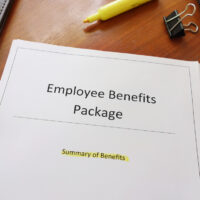What Kinds of Employee Benefits are Required in California?

California law requires employers to provide certain types of benefits to employees. Other benefits are not required by law but may have been guaranteed in the employment contract. Benefits are an important part of an employee’s overall compensation package, just like income and bonuses, and employers can be held accountable if they run afoul of state law by omitting required benefits. Continue reading for a summary of several common types of benefits California employers are required to provide, and contact an experienced California labor and employment lawyer with any questions about how these laws could affect you or your organization.
Social Security Benefits
Wages, up to a certain amount according to law, are taxed in order to provide retirement benefits. The federal government provides Social Security to retirees, which is funded through payroll taxes. Employers are required to pay the same amount in taxes to Social Security as are employees.
FMLA Benefits
The federal Family and Medical Leave Act (FMLA) and the related California Family Rights Act (CFRA) give employees the right to take unpaid leave for family and health reasons. Eligible California employees are guaranteed up to 12 weeks’ unpaid leave for serious health conditions, paternity or maternity leave around the birth of a child, or preparation for a family member’s military service. In most circumstances, you must be returned to the same job at the end of your leave. Additional leave is available for employees who must care for a family member who was seriously injured while on active military duty.
FMLA applies to employers who have at least 50 employees for at least 20 weeks in the current or previous year. Employees qualify for FMLA protections if they have worked for the company for at least a year; worked at least 1,250 hours in that year; and work at a location with at least 50 employees within 75 miles.
Pregnancy Disability Leave
California employees who are pregnant are entitled to up to four months of disability leave because of the pregnancy. This leave can be taken before or after the birth of a child, depending on the mother’s medical condition, and is in addition to the CFRA leave described above. A worker’s job is protected while on PDL.
And now, CFRA covers employers who have at least 20 employees for the purposes of allowing parents to bond with their newborn child before the child’s first birthday.
California Paid Sick Leave
California law requires that employers provide paid leave to workers who fall ill or who must take care of a sick family member. California employees who work at least 30 days within a year from beginning their employment earn at least one hour of paid leave for every 30 hours worked, beginning on the first day of employment. The law applies to virtually all California employees, even part-time or temporary employees. Unused sick leave can be forfeited after a designated period of time and does not have to be paid to employees when they leave their job.
Workers’ Compensation
California employers in all fields must provide workers’ compensation insurance, regardless of the type of business or the number of employees. If an employee is injured at work or becomes sick as a result of working, the employer is responsible for a variety of benefits including medical care, disability, and rehabilitation. Employees are guaranteed prompt medical treatment regardless of fault in a workplace accident.
Holidays and Vacations
State law does not require that employers provide paid time off for holidays. Employers may, however, be required to accommodate employees for religious holidays. If you believe your employer is discriminating against you based on your religion, for example by not allowing you to switch shifts for the sake of a holiday, you may have a claim.
Employers are also not required to provide vacation but, if they do, then paid vacation days are considered income. This means that if an employee does not use their vacation days, then the employer owes wages for those days. If an employee leaves a job with earned but unused paid leave, the employer is required by law to pay wages for those unused vacation days.
Final Wage Payment
California law requires that when an employer terminates (fires, lays off, etc.) an employee, the employer must pay all wages—including any vacation or PTO—owed to the employee at the time of termination. The law also requires that the employer pay all owed wages within 72 hours of the employee quitting. However, if an employee gives notice at least 72 hours before quitting, the employer must pay all owed wages on the last day of employment.
If you are a San Francisco employer or employee needing personal assistance navigating the rules on employee benefits, contact the Richard Koss Bay Area employment law attorneys at 650-722-7046 on the San Francisco Peninsula, or 925-757-1700 in the East Bay.


